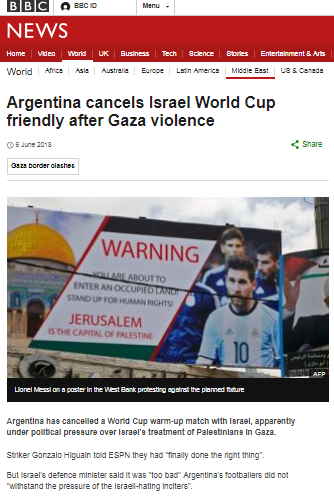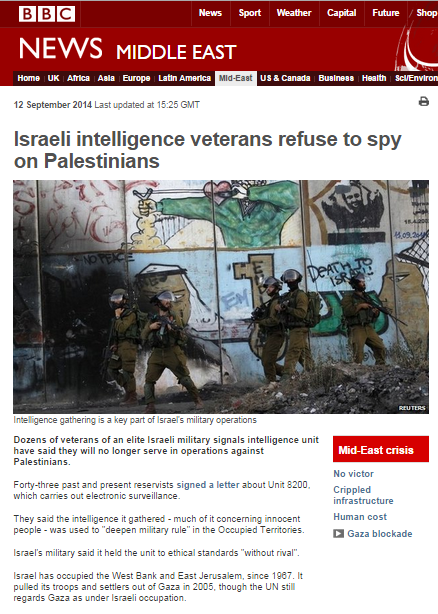As we saw yesterday, a BBC News website report concerning the Argentinian Football Association’s cancellation of a friendly match with Israel framed the background to the decision as being about “Israel’s treatment of Palestinians in Gaza” and/or the fact that “Palestinians […] were angered by a decision to relocate the game” to Jerusalem.
Although the article was later amended to include the full quote from Argentinian striker Gonzalo Higuain rather than the truncated version used in earlier editions, the BBC News website still avoided telling its audiences about the threats received by Argentinian players and their families which were – according to the head of the Argentinian Football Association and the Argentinian foreign minister – the real reason for the game’s cancellation.
In contrast, listeners to the evening edition of the BBC World Service radio programme ‘Newshour‘ on June 6th heard a more accurate version of the story (from 45:05 here) than the one presented by the BBC News website.
Presenter Tim Franks asked his interviewee – an Israeli journalist “with the Argentinian team at their training camp in Barcelona” – why the match was cancelled.
Franks: “The Argentinian team itself; ehm…why did they decide in the end – or why did their football association decide in the end – that they couldn’t go ahead with this friendly game?”
Emmanuel Elbaz-Phelps replied that “the official explanation was that the association – the football association of Argentina – doesn’t want to take any risk for the players” and also noted that:
Elbaz-Phelps: “But we also heard that the decision came yesterday afternoon [Tuesday, June 5th] after the players were having a training session in the morning and there were some protesters and they heard them, they saw them and then they read everything going on in the news about the demonstrations also happening in Argentina and the players had this meeting; they had this talk and they decided they won’t go ahead with the game. Some actually told us that Messi was the person who first made the decision and – as the captain – so everybody was behind him. Another version says that he’s the captain but it was a group decision.”
Franks: “Because Lionel Messi himself was singled out by the head of the Palestinian Football Association Jibril Rajoub, saying if Lionel Messi plays in Jerusalem, we will make sure that he is boycotted, he is targeted around the world.”
Elbaz-Phelps: “Yeah and even more there are reports that threats were made to Messi’s family and to the families of the players.”
Elbaz-Phelps reported having been told that “there were threats on the social media, they got letters and that the players were actually scared about the situation”.
Obviously there are BBC journalists who know that the reason for the cancellation of the match has nothing to do with “Israel’s treatment of Palestinians in Gaza”. The question that therefore arises is why the BBC News website’s report – which, unlike the Newshour report will remain permanently available to the public – has not been amended accordingly.
Related Articles:
How BBC News framed the Argentina-Israel football match story





